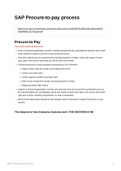Samenvatting
Summary INF3012S SAP Processes Section: Procure-to-Pay and Order-To-Cash Processes
- Vak
- Instelling
All of these notes are a summary of the content in the INF3012S course slides and readers combined. Important sections that are always asked in tests and exams are marked red with “NB” next to it. The notes also have past exam and test questions at the bottom for consolidation after going t...
[Meer zien]




